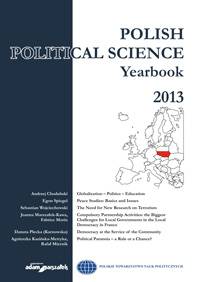MODERN CONCEPTUAL-THEORETICAL TRANSFORMATIONS OF POLITICAL LEADERSHIP
MODERN CONCEPTUAL-THEORETICAL TRANSFORMATIONS OF POLITICAL LEADERSHIP
Author(s): Filip PierzchalskiSubject(s): Political behavior, Political psychology, Politics and society
Published by: Wydawnictwo Adam Marszałek
Keywords: political leadership;political leaders;theory of politics
Summary/Abstract: Scientific discussion on political leadership increasingly takes on the form of interdisciplinary argumentation, in which different research perspectives, models and explanatory conceptual grids overlap. This state of affairs is on the one hand dictated by the contemporary trends in scientific research, especially in the broadly defined social sciences, where the cognitive, explanatory or descriptive relevance is achieved only by taking into account a broader, inter-disciplinary nature of scientific knowledge. In this sense, a thorough, reliable research practice consists primarily in crossing the formal borders of scientific disciplines, where researchers renounce the “complex” of detailed and firm definitions of their own subject of study to turn instead towards integration of knowledge from various, often very different, areas. The above is mainly due to the dispersion of objective scientific knowledge, which is conditioned, among others by: scientific and technical progress, the phenomenon of intertextuality (modern researchers in humanities concentrate their research eff ort on the texts and practices associated with this phenomenon, which means that their primary method in analyses of political phenomena is to fortify the text – specifically, to prepare the scientific text in such a way as to meet the standards of scientific writing and withstand criticism in the absence of the writer); as well as conceptual-theoretical pluralism present in social sciences. On the other hand, it is the result of scientific analysis of the given forms and practices of leadership, where nowadays greater attention is paid to the multi-dimensionality of leadership processes in politics, related to: the multi-level nature of concepts and research (meso, micro and macro-theoretical level analyses) and the need to take into account a large number of variables in the study of leadership (personality and environmental, situational, institutional factors, economic, political or religious variables). The consequence of this state of affairs is the multi-paradigm character of leadership, which in this case means that very often highly different ways of defining and explaining the complex relationship between a particular political leader and followers co-exist within the discipline. In addition, the multiplicity of paradigms of political leadership is a feature demonstrating the interdisciplinary nature of knowledge generated by political science, where various claims, theses, observations or conclusions complement each other, for example those originating in disciplines such as sociology, law, psychology, management sciences and cultural studies.
Journal: Polish Political Science Yearbook
- Issue Year: 42/2013
- Issue No: 1
- Page Range: 151-162
- Page Count: 12
- Language: English

